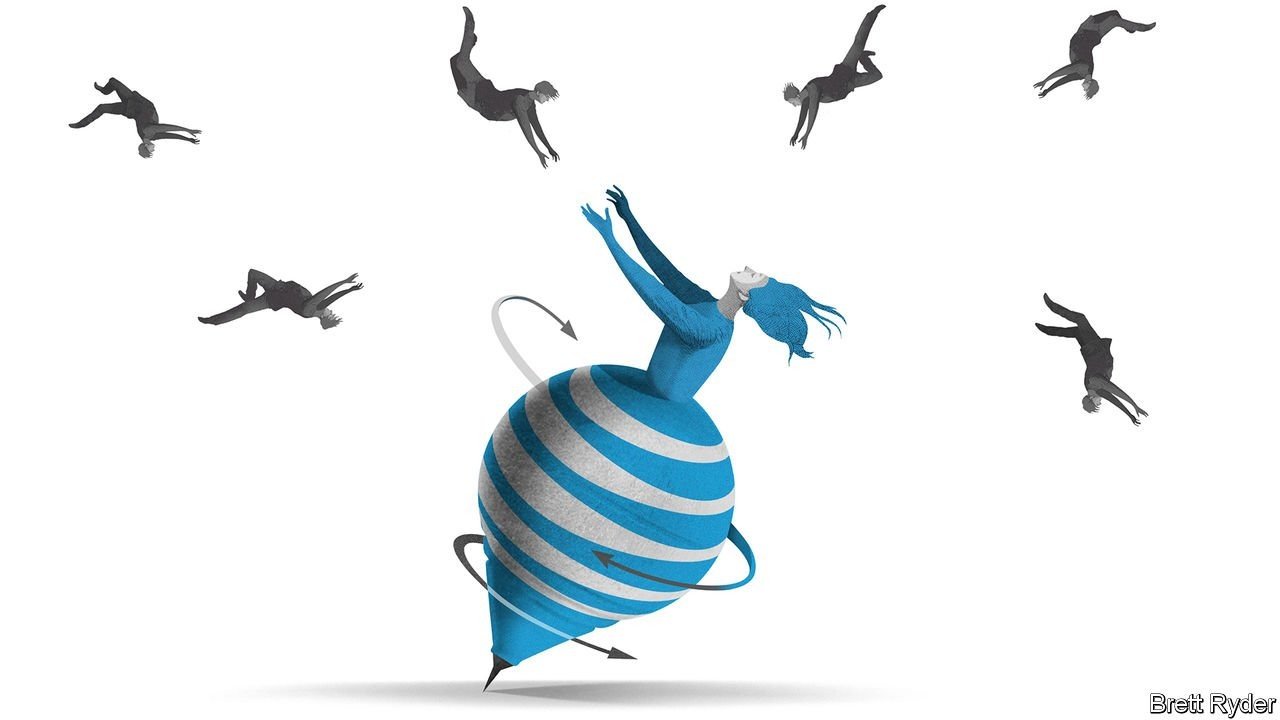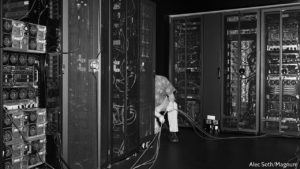https://www.economist.com/node/21801465?fsrc=rss%7Cbus
“SORRY” IS NOT a word you hear often in business. Japanese miscreants may bow in shame. But in the West even architects of some of the world’s most spectacular strategic blunders struggle to express remorse. It took Gerald Levin, boss of Time Warner, a decade to apologise for what he finally admitted was “the worst deal of the century”—the $165bn merger of the media giant with AOL, an internet firm, in 2001, during the dotcom crash. It was unravelled, ignominiously, eight years later.
Who knows when—or indeed if—Randall Stephenson and his former lieutenant, John Stankey, will acknowledge how wrong they were to mastermind the $110bn acquisition of Time Warner by AT& T, which they completed in 2018. The combination created a company weighed down by huge debts, a high dividend and onerous investment demands. A mere three years later it, too, is being dismantled, with the media business spun out and merged with Discovery, another media firm. Mr Stankey, who took over from Mr Stephenson as the telecoms giant’s boss last year, has bowed not in shame, but to the inevitable. It was U-turn or bust.
What to make of such strategic reversals? It is usual to see them all as an indictment of megalomaniacal empire-builders and money-grubbing bankers, at the expense of staff and long-suffering shareholders. And yet business, by its nature, is full of deathtraps. Risks must be taken. Wrong turns happen. Course corrections are inevitable. Not all about-turns merit the equivalent of hara-kiri in the C-suite . Here is a rough guide to when they should and should not be tolerated.
Start with experimentation, the essence of business in a world of constant flux. Most mergers and acquisitions are small, incremental bets. The payoffs can be large. When they go wrong, they cost shareholders money and generate bad headlines, but are forgivable if placed in a spirit of trial and error. Take Verizon, AT& T’s telecoms rival. The firm, now valued at $235bn, spent less than $10bn on AOL and Yahoo, its fellow internet pioneer, in the mid-2010s, hardly breaking the bank as it sought to build a media arm. Their sale, for $5bn plus 10% of shares in May, though embarrassing, marked a retreat, not a rout—certainly compared with the tens of billions of shareholder value that analysts believe AT& T torched on its media binge. Call it misadventure, not madness.
Then there is speculation. Some firms make a living by buying and selling other companies, often using flimsy rationales to justify the purchases. U-turns are an occupational hazard. Headlining this group is SoftBank, a Japanese tech conglomerate, whose twists and turns can cause motion sickness. It has flipped Sprint, an American mobile operator, and is in the process of doing the same with Arm, a British chip designer. Son Masayoshi, its billionaire founder, once portrayed both as strategic acquisitions. Even Warren Buffett, the no-frills chairman of Berkshire Hathaway, a bigger, less techy conglomerate, occasionally pirouettes. Last year Berkshire dumped its holdings of airlines in America as the pandemic raged, just months after increasing its stakes. Airlines have rallied since. “I don’t consider it a great moment in Berkshire’s history,” Mr Buffett conceded recently, “but we have more net worth than any company on Earth.”
Acquisitions are not the only danger zone. Sometimes a firm’s long-term strategy implodes, requiring a big rethink. GE, an industrial group, boasted that GE Capital, its financial arm, was a profit-making machine before discovering that it was also a risky liability when the subprime crisis hit. Airbus, a European aerospace company, halted production of its A380 superjumbo after realising, 12 years into the programme, that airlines did not want it. Intel, no longer the world leader in chipmaking, will rent out some of its production facilities to others, as a foundry. These fall into the category of course corrections, not full-scale flip-flops.
The screeching handbrake turn is in a different league. AT& T is not the only stodgy firm to have tried—and spectacularly failed—to reinvent itself overnight. Under its flamboyant boss J6M (Jean-Marie Messier Moi Même, Maître du Monde), Vivendi, born out of a French water-and-sewage company, sought 20 years ago to re fashion itself as a global entertainment giant, becoming one of France’s biggest corporate casualties in the process. European lenders, as well as Japan’s Nomura, an investment bank, have lost fortunes trying to become racier by buying Wall Street firms. Still, none compares to AT& T and Time Warner for the number of U-turns running through their combined corporate history.
It is worth watching out for three danger signs. First, be alert when deals are billed as transformative. Looking through the fine print of AT&T’s purchase of Time Warner, the main justification, to track customers to sell advertising, was flimsy; it did not warrant the cost. Yet shareholders blithely gave it their blessing. Second, it was no small experiment: the whole company was put on the line. Third, it produced big opportunity costs. The acquisition of Time Warner and DirecTV, a satellite-TV company, in 2015, turned AT&T into America’s biggest non-financial corporate borrower. That constrained it when it needed to spend on 5G mobile spectrum and the Hollywood streaming wars. Even with the Discovery deal and its first dividend cut in decades, it is not out of the woods.
U-turn, you pay the price
The moral of the story is that when deals go wrong, the faster they are unravelled the better. But when they are so big that they jeopardise the future of the firm, accountability is vital, too. Mr Stephenson pocketed $90m from AT& T between 2018, when the Time Warner deal was completed, and the end of 2020, when he left the post of executive chairman. Mr Stankey has earned $60m. Mr Stephenson is gone. Mr Stankey should go, too, if nothing else than to serve as a deterrent against future acts of M& A madness. There may be no apologies in business. But failure on such a grand scale should at least carry a price tag. ■
A version of this article was published online on May 25th, 2021
This article appeared in the Business section of the print edition under the headline “AT&T in a spin”


















